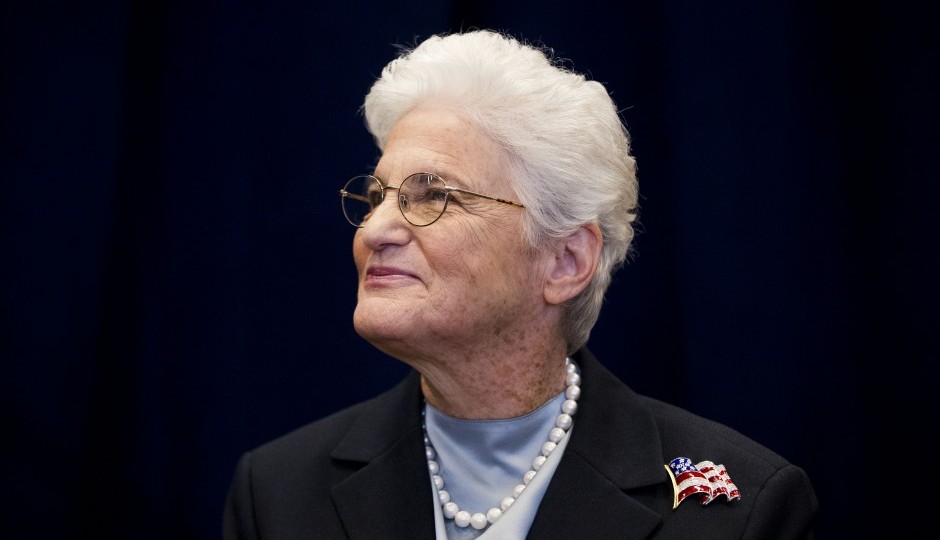The Mayoral Race’s True Frontrunner: Lynne Abraham. Still.

(AP Photo/Matt Rourke)
[Updated: at 10:05 a.m. with new detail on racial breakdown of respondents.]
Tony Williams has got legions of politicos behind him, much of the party apparatus and absurdly deep-pocketed allies in the ‘burbs poised to invest millions to get him elected. Jim Kenney has momentum, the backing of politically potent unions, and the help of some well-funded Super PACs.
And Lynne Abraham? Well, all Abraham has is a big lead on them both.
According to a poll commissioned by Abraham’s campaign, the former district attorney and Philadelphia political fixture would capture 30 percent of the vote if the election were held today. The Inquirer had the story first:
The poll, according to a memo from the campaign’s pollster provided to The Inquirer, has the former district attorney leading the field with 30 percent of respondents saying they would choose her if Philadelphia’s May 19 Democratic primary “were held today.”
Jim Kenney and State Sen. Anthony H. Williams were each favored by 14 percent of respondents. Nelson Diaz was at 6 percent, T. Milton Street at 5, and Doug Oliver at 2.
The undecided vote loomed large, however, at 29 percent…
The poll was taken March 14-17, soon after the March 12 launch of ads touting Kenney. It was conducted by the Mellman Group, a Washington firm with national clients.
These findings aren’t unexpected per se, but it’s nonetheless notable that Abraham is still sitting on such a big lead with the election just 54 days away.
Let’s start with the basics. How did she get such a big lead? It’s pretty simple, really. Abraham has enormous name recognition advantages over all her rivals—19 years worth of exposure on the nightly local news busting bad guys does have its upside.
And yet, in spite of that, she hasn’t been the force in the day-to-day scrum of the campaign that one might assume given her frontrunner status. Abraham has not yet aired television ads (Kenney’s Super PAC allies started airing soft-focus biographical spots two and a half weeks ago, Williams went up this week). Her campaign has also not yet released so much as a single policy paper. She seems to lack the staff support of the Williams and Kenney campaigns.
It’s another sign of just how peculiar this election season is: the clear frontrunner is the candidate who’s been running the lowest-profile campaign.
So how is Abraham keeping her numbers up? She’s held her own (at least) at assorted mayoral forums. She’s also been relatively quick to attack, going after Williams and Kenney over their Super PAC backers, and slamming Kenney for a controversial pension vote. But are those tactics actually resonating with voters? Or are her high numbers purely a residual result of her long service as DA?
When you talk to political pros about Abraham, they all assume her numbers have nowhere to go but down. Most assume she won’t have the money to compete with the Super PACs lining up behind Williams and Kenney. Most assume that the undecideds—and there are an awful lot of them—will break for Williams and Kenney, not Abraham.
That could be true, but it clearly hasn’t happened yet. Abraham’s standing is pretty much identical to what it was in November, when a poll she commissioned showed her with 31 percent of the vote. It’s notable that Abraham, at least in this poll, is also leading among black voters: 24 percent for Abraham, 22 percent for Williams and seven percent for Kenney.
Her lead has proven, so far, to be a lot more durable that the pros predicted. And it’s possible that Abraham’s strong numbers will shake loose some additional donations for her campaign, which is surely part of the reason she shared the results with the Inquirer.
But it’s still relatively early in this late-starting race. Will Abraham’s support hold up when the Super PAC-funded ad barrages begin in earnest? The answer to that question will go a long way toward deciding the outcome of the mayoral race.
What else can be gleaned from this relatively small survey (500 registered voters), with a relatively high margin of error of four percentage points? Well, it looks like Nelson Diaz, Milton Street and Doug Oliver remain marginal candidates. Most voters simply do not know who Diaz and Oliver are, and Street is, well, let’s just say he’s a flawed candidate. Kenney must be at least a little concerned that Abraham’s numbers have not yet started to come down: the two are competing for the same white rowhome votes, and so long as Abraham’s numbers remain in the upper 20s, it’s difficult to see how Kenney can win. Williams may be cheered to see that his standing matches Kenney’s, given that he’s never run a citywide campaign before and was little known outside of his West Philadelphia base (not that Williams or Kenney are relying on Abraham’s polling—they’re likely doing or planning polling of their own). But it’s certainly not a good sign for Williams that both Abraham and Kenney are polling respectably among black voters, 24 percent and seven percent, respectively.